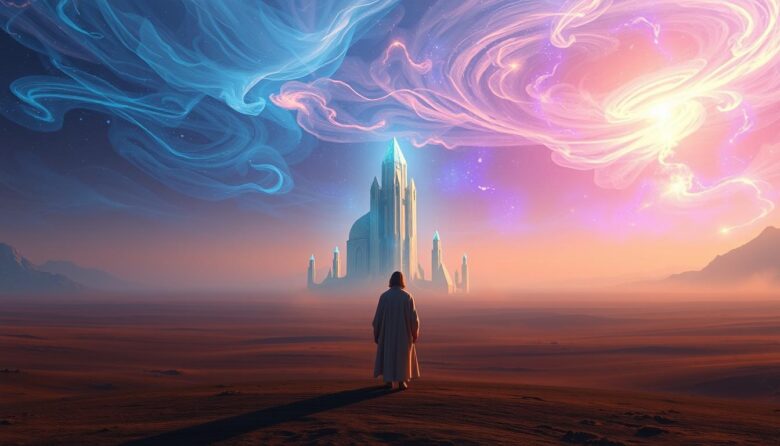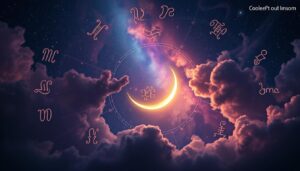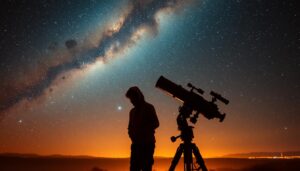Science fiction often sparks our imagination with futuristic tech and alien worlds. But beneath the surface, stories like Dune or Blade Runner explore deeper questions. They ask about existence, morality, and human purpose. This genre isn’t just about lasers and aliens—it’s a mirror reflecting humanity’s search for meaning.
Sci-fi’s most iconic tales ask: What does it mean to be alive? Can technology coexist with ethics? These stories challenge readers to think beyond screens and spaceships. They invite reflection on spirituality, identity, and cosmic connections. The genre’s true power lies in blending wonder with wisdom.
Key Takeaways
- Sci-fi’s spiritual themes go beyond lasers and aliens to examine life’s big questions.
- Classic films and books use futuristic settings to explore timeless human struggles.
- Stories like The Left Hand of Darkness connect gender, spirituality, and identity.
- Technology in sci-fi often symbolizes humanity’s search for purpose and unity.
- Sci-fi encourages audiences to see reality through philosophical and metaphysical lenses.
Understanding the Spiritual Dimension of Sci-Fi
Science fiction is more than just cool gadgets. It’s a way to explore life’s biggest mysteries. It mixes science with themes like self-discovery, morality, and existence. This blend makes spirituality in sci-fi a special place where logic meets wonder.
The Intersection of Science and Spirituality
Sci-fi stories use science to explain cosmic mysteries. Shows like Westworld ask if AI can understand consciousness. Films like Arrival explore talking to the unknown, like spiritual practices of mindfulness. These tales use telescopes to help us look inward.
Exploring Ethical Dilemmas Through Sci-Fi
- AI rights debates mirror real-world discussions on ethics and sentience
- Climate fiction (cli-fi) like Ocean’s Eight parallels eco-spirituality movements
- Time travel stories force reflection on free will vs. destiny
The Role of Imagination in Spiritual Growth
“Imagination is the soul’s laboratory.” — Ursula K. Le Guin
Sci-fi’s imaginary worlds let us test our beliefs safely. Stories about alien life can make us think about our place in the universe. Scenes where characters meditate in zero gravity or talk to AI show spirituality is universal.
By reimagining reality, spirituality in sci-fi encourages us to question, reflect, and grow. It shows that wonder and wisdom go hand in hand.
Iconic Sci-Fi Works with Spiritual Themes
Science fiction often hides deep spiritual lessons in its stories. Three key works show how sci-fi tackles big questions through complex stories. They use metaphors and allegories to explore our minds, who we are, and why we exist.
| Title | Theme | Symbolism |
|---|---|---|
| Dune | Higher Consciousness | Spice as a gateway to transcendence |
| The Left Hand of Darkness | Gender Fluidity | Androgyny representing universal unity |
| Blade Runner | Existential Identity | Replicants questioning humanity’s essence |
Dune and the Quest for Higher Consciousness
Frank Herbert’sDuneexplores humanity’s search for enlightenment. The desert planet Arrakis and its mystical spice are key. The Fremen’s spiritual connection with their environment shows our own quest for self-discovery, blending ecology and mysticism.
The Left Hand of Darkness: Gender and Spirituality
Ursula K. Le Guin’s novel challenges gender norms through Winter’s androgynous people. This sci-fi symbolism questions our assumptions about identity. It suggests that spirituality can go beyond our physical bodies, offering new paths to enlightenment.
Blade Runner and the Nature of Existence
Ridley Scott’sDo Androids Dream of Electric Sheep?uses replicants to ponder what makes life precious. Roy Batty’s famous monologue—
“All those moments will be lost in time…”
—sees artificial beings as reflections of our own existential battles.
These stories show sci-fi’s ability to pose timeless questions through a futuristic lens. They encourage us to think deeply about life’s mysteries, beyond just action and adventure.
The Role of Technology in Modern Spirituality
Technology is changing how we think about spirituality today. Apps, wearables, and other tools mix old practices with new tech. This mix brings fresh views on being mindful, aware, and connected.
How Tech Reflections Shape Spiritual Practices
Tools like meditation apps and biofeedback devices are changing how we practice. Sites like Insight Timer and Calm offer guided sessions with AI help. They adjust to what each person needs.
Wearables track how our bodies feel, making self-awareness something we can measure. Online, we can join global prayer circles or digital yoga classes. This mix of old and new connects us all.
Virtual Reality: A New Frontier for Spiritual Experience
Virtual reality (VR) offers new ways to meditate and perform rituals. Sites like Meditative VR take us on journeys to peaceful places or space. It’s like stepping into a sci-fi story.
Therapists use VR for exercises that help patients. VR temples let us go on virtual pilgrimages. These tools open up new experiences, once only in our dreams.
- VR retreats let users meditate in digital temples or walk virtual labyrinths.
- AI chatbots offer personalized mindfulness advice, adapting to users’ emotional states.
- Augmented reality apps overlay sacred symbols onto physical spaces, merging the tangible and the transcendent.
As tech grows, it doesn’t replace tradition—it reimagines it. The gap between science and spirituality is getting smaller. It shows that fiction can inspire real change.
Characters as Spiritual Archetypes in Sci-Fi
Sci-fi’s most memorable characters are more than just figures in a story. They carry timeless spiritual truths. Their battles and victories reflect our own quests for self-awareness. This makes the spiritual depth of sci-fi hit home, beyond just plot twists and futuristic settings.
“A hero ventures forth from the world of common day into a region of supernatural wonder,” Joseph Campbell reminds us. Sci-fi takes this journey to cosmic scales, making the spiritual journey feel real.
Hero’s Journey in Sci-Fi Narratives
In tales like Ender’s Game, characters like Ender Wiggin show the hero’s quest for enlightenment. They face inner doubts and external threats, just like our own spiritual growth. Each decision forces them to question morality, echoing our own journey to wisdom.
The hero’s return home, changed, symbolizes self-realization. It’s a powerful metaphor for finding oneself.
Anti-Heroes: Lessons in Shadow Integration
Anti-heroes like Walter White in Breaking Bad represent the “shadow integration” in spirituality. They fall into darkness but then find clarity, echoing Carl Jung’s idea of facing the subconscious. Their stories ask: Can we find redemption with our flaws?
These characters show that spiritual depth of sci-fi comes from complexity, not perfection. Whether they rise as heroes or fall as anti-heroes, they mirror our spiritual quests. Their journeys, full of flaws and daring, prove that sci-fi characters are more than just entertainment. They are guides to understanding humanity’s potential.
Parallel Realities and Their Spiritual Implications
Science fiction explores parallel realities, mixing quantum physics with ancient beliefs. Shows like Interstellar and Dark delve into free will and destiny. They blend science with spiritual questions.
Quantum Mechanics and the Multiverse Concept
Quantum theories say every choice creates a new world. Sci-fi writers use this idea to tackle big questions. It connects with spiritual thoughts of interconnectedness.
- The Stranger Things Upside Down shows shadow worlds, reflecting our fears and desires.
- Marvel’s Doctor Strange shows infinite paths, like karmic cycles in Eastern philosophies.
“Every choice creates a new universe. What would you do differently?” — Dark (Season 3)
Reincarnation Theories in Sci-Fi
Shows like Avatar: The Last Airbender see reincarnation as learning across lifetimes. Films like Ghost in the Shell ask: Can consciousness live on after death?
Sci-fi reimagines karma with AI and digital systems. It makes us think about personal growth and balance. These themes are important in science and spirituality.
The Influence of Eastern Philosophy on Sci-Fi
Sci-fi often draws from ancient Eastern philosophies to delve into deeper themes. These ideas add hidden meanings in sci-fi, shaping how stories explore humanity’s role in the universe. By incorporating meditation, balance, and interconnectedness, these philosophies bring timeless wisdom to futuristic tales.
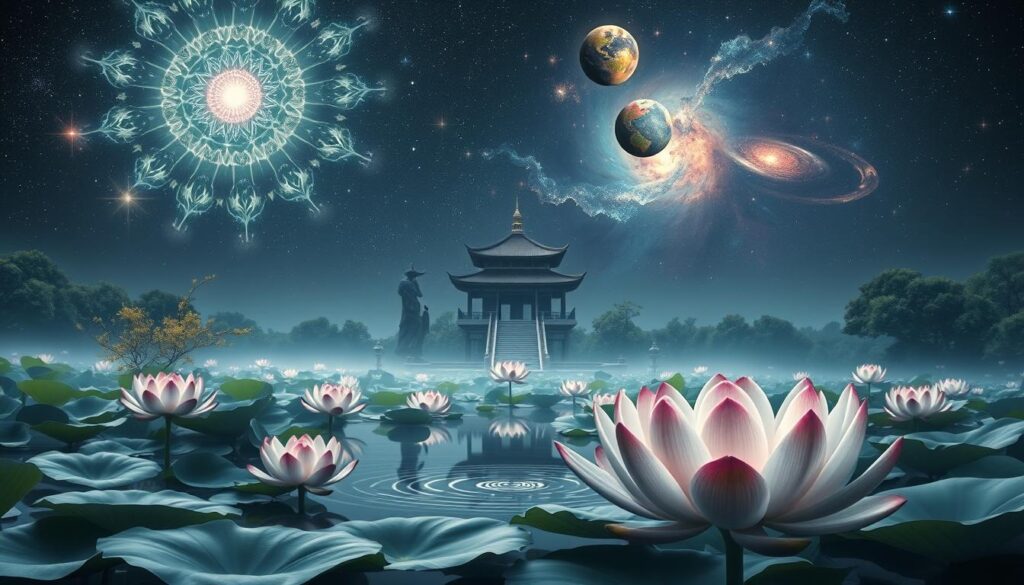
Buddhism and Future Societies
In Ghost in the Shell, characters face identity through Buddhist ideas of impermanence. They question what makes up consciousness. Films like Arrival use time perception to show mindfulness, mirroring Buddhist teachings on living in the moment. These stories use technology to explore spiritual questions.
Taoism’s Implicit Presence in Sci-Fi Narratives
Taoist ideas of harmony show up in stories where nature and technology meet or merge. The Matrix series contrasts human free will with machine logic, reflecting Taoist yin-yang principles. Even Avatar: The Last Airbender uses elements like water and fire to symbolize balance. It embeds hidden meanings in sci-fi through Taoist-inspired conflicts and solutions.
Sci-Fi as a Mirror to Contemporary Issues
Science fiction often shows our modern struggles. It mixes urgent global challenges with the spiritual aspects of science fiction. Stories that tackle climate collapse or inequality make us think about ethics, identity, and our purpose in a broken world.
Environmentalism and Spiritual Awakening
Shows like Avatar: The Last Airbender and The 100 use ecological disasters to make us think. When characters face empty landscapes or wars over resources, the stories push us to see our role in nature. This connects to old spiritual teachings about living in harmony with Earth.
- Avatar: The Last Airbender: Balance between elements as a metaphor for ecological stewardship
- Annihilation (2018 film): Explores environmental decay through surreal, meditative visuals
Social Justice Themes in Popular Series
Series like Parable of the Sower (based on Octavia Butler’s novel) and Watchmen’s look at racial trauma. They show how sci-fi sees social justice as a spiritual journey. Characters facing oppression often find empathy and a sense of responsibility, echoing teachings on unity and justice in many faiths.
“Sci-Fi’s power lies in its ability to make the familiar strange, forcing us to confront systemic flaws through a lens of cosmic perspective.”
By linking crises like climate change or inequality with big questions, sci-fi is more than just a way to escape. It’s a call to action, rooted in our shared spiritual quest for balance and fairness.
Fan Cultures: Building Communities Around Spirituality
Fandoms turn sci-fi into a journey we all explore together. Online forums and local meetups are where fans dive into themes of purpose and connection. They find growth in the shared love for sci-fi’s big questions.
The Role of Fandoms in Personal Growth
Fans join groups to dig deeper into stories. Sites like Reddit’s r/philosophyofsciencefiction spark talks on ethics and existence. This turns casual viewers into thinkers, linking sci-fi to real-world reflection.
Spiritual Gatherings at Sci-Fi Conventions
Conventions now host panels that explore sci-fi as a spiritual journey. Workshops like “Kabbalah in Star Trek” or “Meditation Inspired by Avatar’s Na’vi” resonate with attendees. These events mix pop culture with mindfulness.
- Panel discussions on AI and free will
- Guided meditations based on sci-fi lore
- Workshops on world-building as self-discovery
“Sci-fi conventions are where I found people who see stories as metaphors for life’s mysteries,” says attendee Mia Torres at San Diego Comic-Con 2023. “It’s like attending a modern-day parable circle.”
Bridging the Gap: Faith and Science Fiction
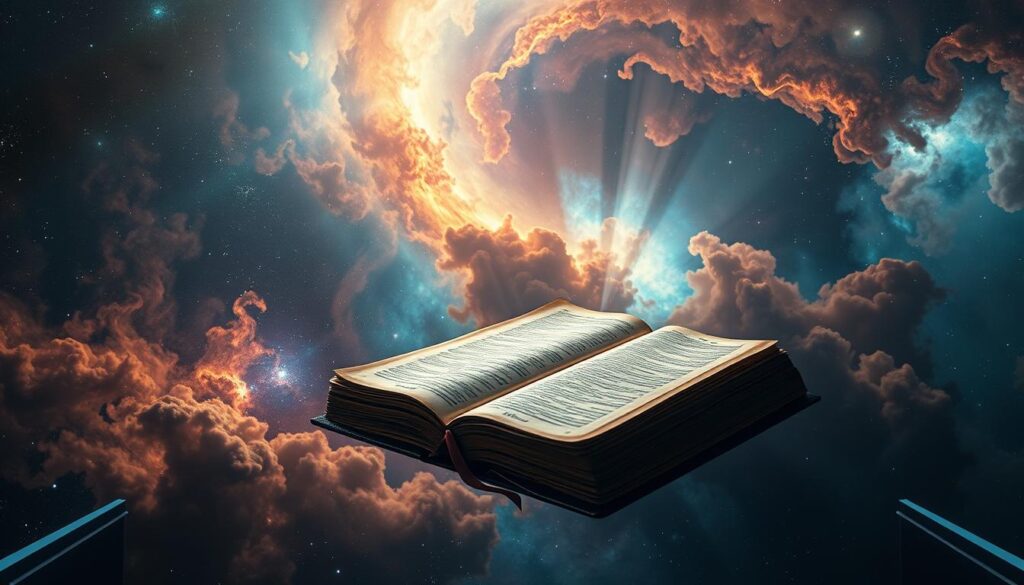
Science fiction makes us think about faith and logic together. It shows how faith and science can work side by side. Authors create stories that make us ponder the big questions of life.
Dialogues on Creationism and Evolution
“The universe is a mystery we’re meant to unravel with both wonder and reason.”
Books like Creation: The Origins of Life by Richard Dawkins mix science and spirituality. They imagine worlds where old texts and DNA discoveries shape our views. These stories spark debates on how beliefs change with new discoveries.
Sci-Fi Authors Who Explore Religious Themes
| Author | Work | Themes |
|---|---|---|
| Orson Scott Card | Ender’s Game | Moral choice vs destiny |
| Mary Doria Russell | The Sparrow | Religion and alien first contact |
| Ted Chiang | Stories of Your Life | Time, free will, and cosmic purpose |
These writers show faith and progress can go hand in hand. Their stories show how spiritual questions drive our curiosity. By mixing theology with technology, sci-fi opens up for discussion.
The Future of Spirituality in Sci-Fi
Science fiction is growing, and its spiritual side is playing a big role. Stories now face big questions with new ideas, mixing tech with old themes. This shows a bright future where sci-fi and spirituality will blend more.
Emerging Trends in Genre Blending
Future tales will combine sci-fi with fantasy or horror to explore deeper. Movies like *Annihilation* already mix alien worlds with personal journeys. This shows how blending genres can open up talks on identity and purpose.
We’ll see more stories where AI, climate issues, or travel between worlds symbolize personal growth.
Predictions for the Next Generation of Stories
Stories might show AI searching for wisdom or virtual reality helping with meditation. Shows could delve into eco-spirituality due to climate change, like *Dune* did. Writers might also use quantum physics to retell old myths, offering new views on life.
